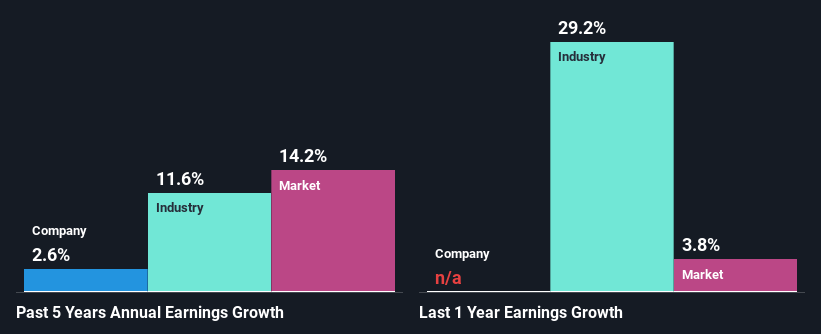Is The Market Rewarding Tectona Ltd (TLV:TECT) With A Negative Sentiment As A Result Of Its Mixed Fundamentals?
It is hard to get excited after looking at Tectona's (TLV:TECT) recent performance, when its stock has declined 19% over the past three months. It seems that the market might have completely ignored the positive aspects of the company's fundamentals and decided to weigh-in more on the negative aspects. Long-term fundamentals are usually what drive market outcomes, so it's worth paying close attention. In this article, we decided to focus on Tectona's ROE.
Return on equity or ROE is an important factor to be considered by a shareholder because it tells them how effectively their capital is being reinvested. Put another way, it reveals the company's success at turning shareholder investments into profits.
View our latest analysis for Tectona
How Do You Calculate Return On Equity?
The formula for ROE is:
Return on Equity = Net Profit (from continuing operations) ÷ Shareholders' Equity
So, based on the above formula, the ROE for Tectona is:
8.5% = US$1.0m ÷ US$12m (Based on the trailing twelve months to June 2024).
The 'return' is the yearly profit. One way to conceptualize this is that for each ₪1 of shareholders' capital it has, the company made ₪0.09 in profit.
What Is The Relationship Between ROE And Earnings Growth?
So far, we've learned that ROE is a measure of a company's profitability. Depending on how much of these profits the company reinvests or "retains", and how effectively it does so, we are then able to assess a company’s earnings growth potential. Generally speaking, other things being equal, firms with a high return on equity and profit retention, have a higher growth rate than firms that don’t share these attributes.
Tectona's Earnings Growth And 8.5% ROE
When you first look at it, Tectona's ROE doesn't look that attractive. We then compared the company's ROE to the broader industry and were disappointed to see that the ROE is lower than the industry average of 18%. Accordingly, Tectona's low net income growth of 2.6% over the past five years can possibly be explained by the low ROE amongst other factors.
Next, on comparing with the industry net income growth, we found that Tectona's reported growth was lower than the industry growth of 12% over the last few years, which is not something we like to see.

Earnings growth is a huge factor in stock valuation. What investors need to determine next is if the expected earnings growth, or the lack of it, is already built into the share price. This then helps them determine if the stock is placed for a bright or bleak future. Is Tectona fairly valued compared to other companies? These 3 valuation measures might help you decide.
Is Tectona Efficiently Re-investing Its Profits?
Tectona doesn't pay any regular dividends, meaning that potentially all of its profits are being reinvested in the business. This doesn't explain the low earnings growth number that we discussed above. So there might be other factors at play here which could potentially be hampering growth. For example, the business has faced some headwinds.
Conclusion
Overall, we have mixed feelings about Tectona. While the company does have a high rate of profit retention, its low rate of return is probably hampering its earnings growth. Wrapping up, we would proceed with caution with this company and one way of doing that would be to look at the risk profile of the business. You can see the 5 risks we have identified for Tectona by visiting our risks dashboard for free on our platform here.
Valuation is complex, but we're here to simplify it.
Discover if Tectona might be undervalued or overvalued with our detailed analysis, featuring fair value estimates, potential risks, dividends, insider trades, and its financial condition.
Access Free AnalysisHave feedback on this article? Concerned about the content? Get in touch with us directly. Alternatively, email editorial-team (at) simplywallst.com.
This article by Simply Wall St is general in nature. We provide commentary based on historical data and analyst forecasts only using an unbiased methodology and our articles are not intended to be financial advice. It does not constitute a recommendation to buy or sell any stock, and does not take account of your objectives, or your financial situation. We aim to bring you long-term focused analysis driven by fundamental data. Note that our analysis may not factor in the latest price-sensitive company announcements or qualitative material. Simply Wall St has no position in any stocks mentioned.
About TASE:TECT
Tectona
Focuses on the digital asset, cryptographic currencies, and blockchain technology businesses.
Adequate balance sheet with slight risk.
Market Insights
Community Narratives



